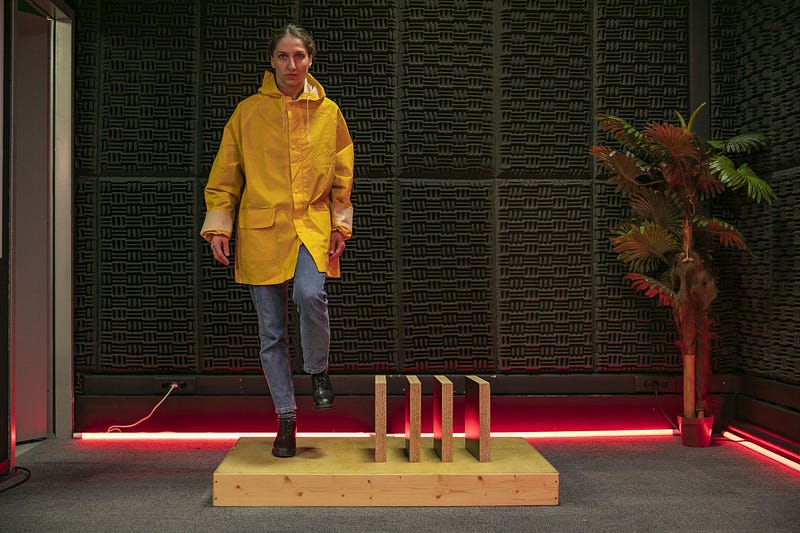UNMUTING BODIES | IOANNA PARASKEVOPOULOU


Horse = Coconuts
Air = Rope
Pool of water = (h) Vessels of water
Wings = Umbrella
Waterfall = Bucket of water
Toweling hair = Rubbing feet on front door mat
These absurd equations are excerpts of notes made by Ioanna Paraskevopoulou, a dancer and choreographer who lately deals with the process of Foley in her works. Interwoven with the film industry, but having its origins in the first radio productions, Foley is the technique of producing sounds in a recording studio, by more or less predictable means, so that it corresponds to an on-screen action that lacks natural sound or reinforces the impact of an existing one. By revealing this part of film production which remains invisible to the audience, Paraskevopoulou turns it into a spectacle itself, unearthing the beauty and poetry that is often hidden in the “making of” process. During the COVID-19 pandemic and its ensuing restrictions, the dancer practiced this kinetic research in her domestic space using household items while she was studying remotely in the Department of Audio and Visual Arts of the Ionian University. At the time, this research served as a creative outlet for Paraskevopoulou, proving that making art with few means was still possible, despite the undeniable difficulties in the professions of dance and performance at that time.
This idea born during this period of isolation has been mainly translated into two works — and other pieces in progress — one of which was presented for the online version of the Onassis New Choreographers Festival 8 (All she likes is popping bubble wrap, 2021) and another one on stage for the Onassis New Choreographers Festival 9 (Mos, 2022). In Mos, which is the closest to what the choreographer originally had in mind, the relationship between image, movement and sound is explored in its full complexity, each element in constant interplay with the others. In the first part of the choreography, Foley art is performed by Paraskevopoulou and Giorgos Kotsifakis in its classical form — synchronizing with excerpts of famous films like The Night of the Living Dead (1968) — bringing spectators back to the years when foley artists were recording live in a one off performance and had to perfectly synchronize with the image in real time. As much as this act is a revelation of film production it does not demystify the work itself. On the contrary, isolating this part highlights its qualities as an autonomous process and emphasizes the kinetic interest it manifests individually.

In the second part of Mos the moving image disappears, but the dancers remain on stage becoming sound and image themselves, while dancing to tap dance, a type of dance that was a spectacle itself par excellence, associated with big movie production and a means of entertainment in its own right. The tap dances continues, this time on a special sound-absorbing material that removes any sound — an homage to the scene of one minute’s silence in the film Band of Outsiders (1964) by Jean-Luc Godard, where the sound is completely removed from the image awakening the attention of the viewer. Paraskevopoulou tests the silence on the stage while maintaining the movement, creating an absurd situation. Following the tradition of many artistic experimentations with silence, this one also demonstrates how the attempt to hear the void makes silence richer, focusing on other sounds produced by the condition that defines any kind of performance: the existence of an audience.

As the performance reaches its end, the dancers bring the microphone close to their heart which beats loudly and resembles the sound of running horses, symbolizing in a way the evolution of the performance from a purely technical and controlled process to an emotional and unpredictable one. Instead of blindly adhering to the Foley technique, the performance pushes the boundaries of dance by revisiting some of its fundamental principles through an unmuting of the body, unchaining it from the classical idea that any movement, even the most impressive, must look effortless and be silent. In doing so, it troubles the audience’s expectations, playing with its need for immersion in the illusion of the entertainment industry. Using an old technique to bring current questions to the forefront and challenging the dance milieu and the audience Paraskevopoulou proposes a holistic choreographic approach rather than an experiment; a return to our senses, to our expectations of spectacle and the illusions we allow ourselves to have.
Ioanna Paraskevopoulou is a dancer and a SNF ARTWORKS Dance Fellows (2019).
Eva Vaslamatzi (SNF ARTWORKS Fellow 2019) is an independent curator and writer currently based in Athens, Greece